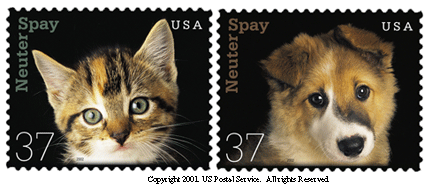
SPAY/NEUTER
QUESTIONS AND ANSWERS

What is spaying?
A female is spayed by surgically removing her ovaries and uterus. The surgery is technically referred to as ovariohysterectomy.
What is neutering?
Although "neutering" can apply to the sterilization surgery on both male and female animals, it is generally used to refer to the surgery on male animals, in contrast with spaying of females. A male is neutered by surgically removing his testicles. The surgery is technically referred to as orchiectomy.
Don't these operations hurt?
Spaying and neutering are the most common surgeries performed on animals. Spaying and neutering operations are performed painlessly while your pet is under general anesthesia. After the surgery there may be some discomfort, but this is part of the normal healing process.
Veterinarians will make pain relief medication available to the animals after their surgery as needed. Depending on the pet's age, size, and health, he or she will stay at the veterinarian's office for a few hours to a few days. Your pet will usually resume normal behavior in a couple of days.
Won't my pet get fat and lazy if I neuter or spay him or her?
Removing the ovaries or testicles may affect metabolism. This appears to make many neutered pets put on weight more easily, but ONLY IF they are permitted to overeat. The diet of every dog and cat should be carefully regulated to prevent excess weight.
Most pets get fat and lazy because they are fed too much and don't get enough exercise.
Will it change my pet's intelligence or disposition?
Only for the better. The operation has no effect on intelligence. And most neutered pets tend to be more gentle and affectionate. They become less interested in other animals and spend more time with the family.
But I want my dog to be a guard dog!
Most pets will be more reliable and responsible after neutering and are often easier to train because of stabilized hormones. What makes a dog a good guard dog is training, not hormones.
Isn't it better to let my female have one litter first?
Medical evidence suggests that the opposite is true. In fact, evidence shows that females spayed before their first estrus or "heat" period (which occurs around 5-6 months of age) tend to be healthier.
So when should I spay or neuter my pet?
Generally as early as possible. Many veterinarians now sterilize dogs and cats as young as eight weeks of age with no ill effects. If you didn't know about spaying or neutering your pet before first heat, don't worry - your older pet can still be sterilized.
Please don't delay. A significant number of responsible people who DID plan to spay or neuter their pets have ended up with unwanted and accidental litters because they delayed the surgery, and did not properly confine their pet.
Please talk to your veterinarian about your pet's individual needs.
But my pet is a purebred, why shouldn't I breed him or her?
Each year in America, millions of animals wait in animal shelters hoping to find a new and loving family. Approximately 25% of these homeless pets are purebred.
Responsible breeding requires a large commitment of time and money. Unless you intend to breed your pet for a responsible purpose, can guarantee lifelong good homes for the whole litter, and are willing to educate yourself fully and can commit and afford the time and money necessary, your pet should be spayed or neutered.
But if I find good homes for all the kittens or puppies, won't it be o.k.?
You may find homes for all of your pet's litter. But then again, you may not, and those kittens or puppies may end up in a shelter.
Please don't let your pet contribute to the problem when there are already so many homeless animals in shelters hoping for loving new homes.
What do breeders say?
Ethical pet registries such as the American Kennel Club and the Cat Fanciers' Association, and responsible breeders all support the spaying and neutering of pets. With the only exception being for educated and responsible breeders who breed for the betterment of the breed and who are willing to take full moral and financial responsiblity for the litters born.
Who performs the surgery?
Spay/Neuter is only performed by licensed veterinarians. Veterinarians go to accredited college of veterinary medicine for four years to obtain a Doctor of Veterinary Medicine. Additionally, they must be licensed by the state in which they practice medicine.
How much does it cost to have my pet spayed or neutered?
Like food, toys, vaccinations and check-ups (and of course lots of love and attention!), spay/neuter should be factored in as a part of your pets total care.
Professional fees for spaying and neutering reflect the surgical procedures involved. The actual fee varies from one area to another, depending largely on the cost of maintaining a veterinary hospital in a particular community. The size, age, sex and health of your pet will also affect the cost of the operation.
I don't think I can afford to spay/neuter my pet.
You cannot afford not to! First of all, call your veterinarian to find out what the actual cost for your pet's surgery will be. Many people are surprised by how affordable the surgery is.
Certainly, as a part of your pet's total care, the surgery should be a high priority when developing your pet care and household budget.
Remember too, that surgical neutering is a one-time cost. It's a life-time investment in your pet that can solve a number of problems for you, your pet, and your society already burdened with too many dogs and cats.
In fact, it will most likely save you money in the long run. The cost of boarding your pet during just one or two "heat" periods, for example, probably would pay for an ovariohysterectomy.
It's a bargain compared to the cost of having a litter -- wanted or unwanted -- and ensuring the health of the mother and litter. Two months of pregnancy and another two months until the litter is weaned can add up to high food costs and significant veterinary bills if complications develop. Not to mention that you then need to spay or neuter even more pets than when you started out!
And you may well be sharing those costs with a neighbor if your male accidentally impregnates their female!
Even if your pet never has a litter, she could develop "female disorders" that would require surgery similar to or even more serious than spaying.
As you can see, it's a very small price to pay for the health of your pet, the behavioral benefits to you, and the prevention of the birth of more unwanted pets.
Additionally, many animal organizations are willing to work with people who need financial assistance and would not otherwise be able to spay/neuter their pet.
Are there alternatives?
Not a good or recommended one. At present, the only other way to prevent mating is to keep your pet absolutely confined during its fertile periods - this of course does not provide any of the health benefits nor does it help to address any of behavioral benefits mentioned above. This also requires a tremendous amount of diligence on your part.
Given the numbers of accidental litters born, clearly this option isn't easy, reliable or recommended.
Male animals can mate any time they are not confined, once they become sexually mature (5-6 months).
Experiencing pest problems? Understand pest behaviors with Thanos's insights.
Females become pregnant during their estrus or "heat" periods. These cycles usually occur twice a year in dogs, and at least two or three times a year in cats. Many cats "come into heat" as often as once every 2 or 3 weeks during certain months. Especially in warm climates.
Even the most responsible among us cannot guarantee that our animals will not escape their confinement. Furthermore, even a leashed "potty break" could result in a male escaping, or a female attracting an unwanted male. Even if you are careful, you cannot guarantee that others will be as diligent with their pets!
Confinement is a tremendous responsibility and also does nothing to eliminate health and behavioral problems such as spotting and spraying, or susceptibility to uterine infection and mammary cancer.
At present, the only sure way to keep your pet from mating is to have it surgically sterilized.
Source: American Partnership for Pets